Humane Society International
Issue Type: Companion Animals
Community efforts bring 20,000 dogs to care, help slow down spread of rabies
Humane Society International / India

LUCKNOW, Uttar Pradesh— On World Spay Day, Humane Society International/India and Lucknow Municipal Corporation celebrate sterilizing and vaccinating 70% of the street dog population in Lucknow, achieving the goal set forth by the city’s first-ever Animal Birth Control program launched in 2019 by HSI/India. A recent survey conducted by HSI/India reveals that over 73,000 street dogs have been sterilized and vaccinated, effectively curbing street dog population growth and preventing puppies from entering a life of suffering. The sterilization project has succeeded in preventing inhumane population control methods such as culling or relocation.
With the 70% sterilization and vaccination mark achieved, Lucknow is on the path to becoming Uttar Pradesh’s first city that will soon reach 80% sterilization of its street dog population. Vaccinating dogs, supported by effective dog population management, is the most cost-effective strategy for preventing rabies in people. On World Spay Day, Lucknow met the 70% vaccination coverage, signaling effective control of canine rabies, as endorsed by the World Health Organization in its Rabies – Zero deaths by 2030 report.
Robust community support has enabled the teams to reach such a high dog sterilization level. “Paving the way for behavioral transformation in societies, community members have played a crucial role”, said Dr. Piyush Patel, Director of Companion Animals and Engagement, HSI/India. “At least 28% of the dogs served by the program, or around 20,000 street dogs, were brought to the Animal Birth Control clinic in Jarhara for spay/neuter services by community members. This indicates that people are now well-aware of the program’s benefits for both humans and dogs. Our next goal is to hit 80%,” he added.
Dr. Patel envisions Lucknow serving as a national model, a “training and learning” hub, and an inspiration to other Indian cities. “Along with high-volume dog sterilization, active community education through workshops on rabies awareness and dog behavior has been the key to achieving this milestone,” said Dr. Arvind Rao, additional commissioner, of Lucknow Municipal Corporation.
HSI/India’s “walk-in Saturdays” made accessible to communities sterilization and vaccination of street dogs by making these services free every Saturday. Dr. Rao added: “Our city will benefit from our proactive actions. I urge every citizen in Lucknow to bring their unsterilized dogs for spaying and vaccination, to improve dog welfare, rabies control and create healthy communities.”
Media contact: Shaili Shah, sshah@hsi.org ; 993-059-1005
Humane Society International / Southeast Asia
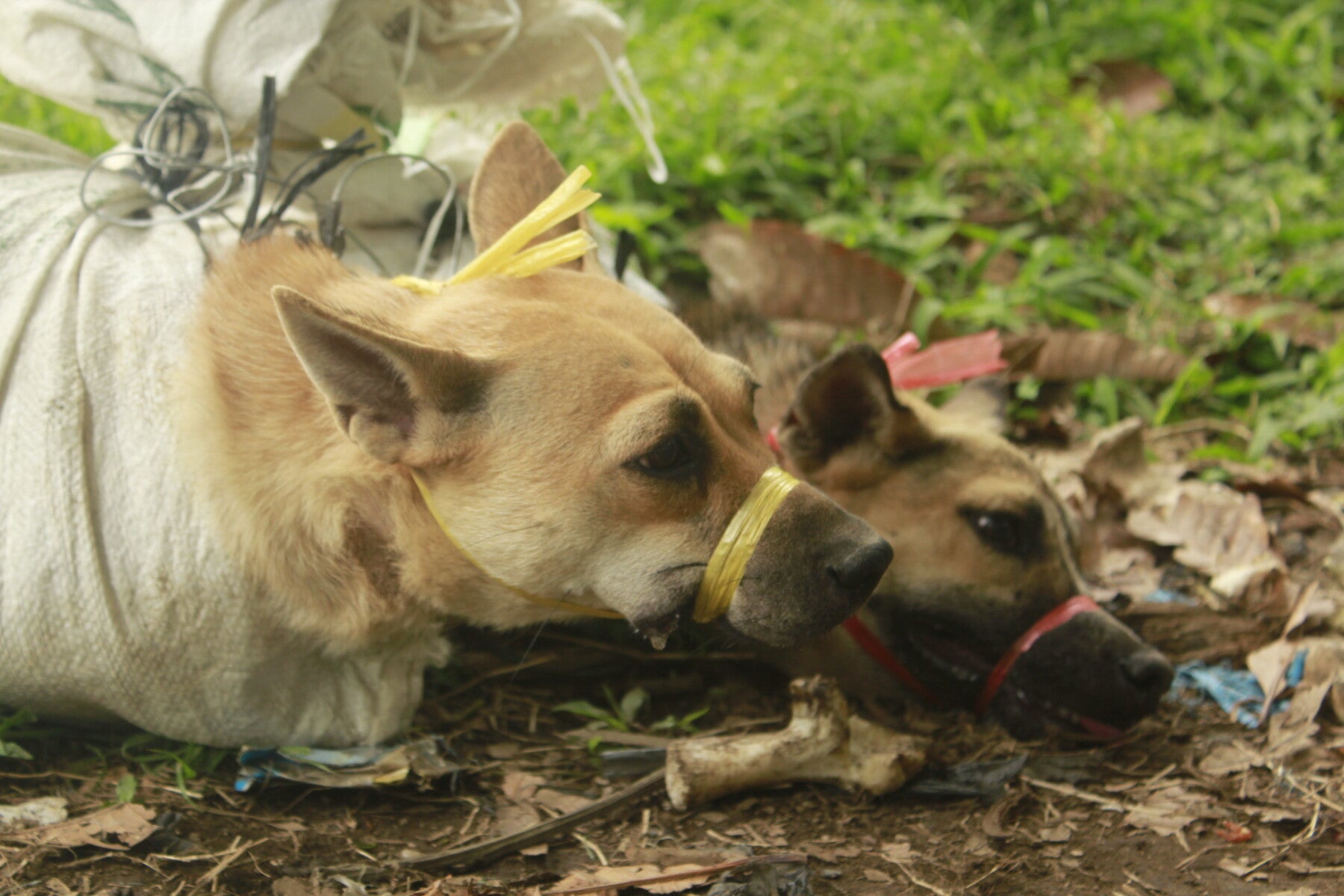
JAKARTA―Indonesia’s animal-loving public rallied outside the House of Representatives in the capital Jakarta today to deliver a letter calling on the government to introduce a nationwide ban on the cruel dog and cat meat trades. More than a million companion animals are stolen, trafficked and brutally killed for meat each year across Indonesia. They endure grueling journeys to supply demand hotspots, many dying on the way from heatstroke, dehydration, disease or injuries inflicted during capture and transport. Those who survive are taken to slaughterhouses and markets where they are bludgeoned and killed in full view of other dogs and cats.
The rally, led by the Dog Meat Free Indonesia coalition and Animals Hope Shelter in collaboration with five other national groups and coalitions*, follows the high-profile interception last month of 226 dogs in Central Java being trafficked for meat. It also comes just weeks after the parliament in South Korea passed a national ban on the dog meat industry there, which campaigners hope will inspire the Indonesian government to act.
DMFI has campaigned for an end to these trades for years, conducting numerous shocking investigations into the underworld network of dog and cat thieves, traffickers, traders and slaughterers. As a result of DMFI campaigns, more than 50 cities, regencies and provinces across Indonesia―including the Special Capital Region of Jakarta―have introduced bans on the trades, but campaigners say that without a robustly enforced national ban, the trades will continue unabated.
Evidence from both Indonesia and throughout the region has demonstrated the rabies risk the dog meat trade poses, facilitating its transmission and hindering attempts to eliminate the fatal disease, jeopardising the ASEAN pledge to eliminate dog-mediated rabies by 2030.
Lola Webber, director of campaigns to End Dog Meat at Humane Society International, a DMFI member group, says: “More than a million dogs and untold numbers of cats are snatched from their homes or the streets and endure immense cruelty for the meat trade in Indonesia. This trade continues despite the fact that only a small fraction of the population eats dog and cat meat and the trade poses a very real threat to the health of the whole nation by facilitating the spread of deadly rabies and other diseases. Most people here in Indonesia want a national ban to end this cruelty once and for all, and all of us attending this rally hope that the example recently set by South Korea will inspire Indonesia to become the next country in Asia to ban this trade for good.”
A Nielsen opinion poll in January 2021, commissioned by DMFI, revealed that 93% of Indonesians support a national dog meat ban with fewer than 5% having ever consumed dog meat and 88% agreeing that the issues of the dog meat trade and consumption of dog meat need to be addressed immediately by all political parties.
Karin Franken, founder of Jakarta Animal Aid Network, a DMFI member group, said: “We are rallying here alongside national animal protection groups and activists on behalf of the millions of dog and cat-loving and concerned citizens across Indonesia, to call for a national ban on the brutal dog and cat meat trades. These trades are intolerably cruel and dangerous, and it’s time for our government to prioritize the health and welfare of both animals and people by implementing a nationwide ban.”
Karen O’Malley, Programme Manager for Ending the Dog and Cat Meat Trade at FOUR PAWS International, a DMFI member group, said: “Across Asia, an estimated 30 million cats and dogs are stolen from their homes or the streets, transported long distances in awful conditions, then brutally slaughtered for their meat, every single year. Now is the time for this cruel trade to be brought to an end, for the health and welfare of both animals and humans. We are hopeful that Indonesia, along a number of their Southeast Asian neighbours, will follow South Korea in introducing a nationwide ban.’
Facts
- The dog meat trade is now banned in more than 50 cities, regencies and provinces across Indonesia. In July 2023, Indonesia’s notorious Tomohon “Extreme” Market in North Sulawesi province introduced a ban on dog and cat slaughter and meat trade sales, following negotiations with DMFI members Humane Society International and Animal Friends Manado Indonesia.
- In addition to the 50+ locations in Indonesia, across Asia the trade in and slaughter, sale and consumption of dogs is also banned or otherwise ended in Taiwan, Hong Kong, the Philippines, Thailand, South Korea (coming into force 2027) and two major cities in mainland China.
- Dog Meat Free Indonesia is a coalition of national and international animal protection organizations comprising Jakarta Animal Aid Network, Animal Friends Jogja, Humane Society International, Animals Asia and FOUR PAWS. The coalition exposes the brutality of the trades and campaigns for a ban on the grounds of animal cruelty and risks to public health.
ENDS
* Full list of participating groups: DMFI coalition, JAAN domestic, Humane Society International, FOUR PAWS International, Animals Asia, Animal Friends Jogja, Natha Satwa Nusantara, Koalisi Perlindungan Hewan Indonesia, Animal Friends Manado Indonesia, Animal Hope Shelter, Animals Don’t Speak Human, LBH Perlindungan Hewan Indonesia.
A copy of the letter submitted to the House of representatives is available here (ENG) and here (Bahsasa Indonesia)
Photos and videos of dog meat trading operations in Java, copyright Dog Meat Free Indonesia
MEDIA CONTACTS:
Indonesia
- Lola Webber, Humane Society International’s director of campaigns to End Dog Meat, and DMFI coordinator, lolawebber@yahoo.co.uk; +6281337408768
- Karin Franken, Jakarta Animal Aid Network Founder, and national coordinator Dog Meat Free Indonesia Coalition, jaan_adopt@yahoo.com; +6282122487794
Humane Society International / Indonesia
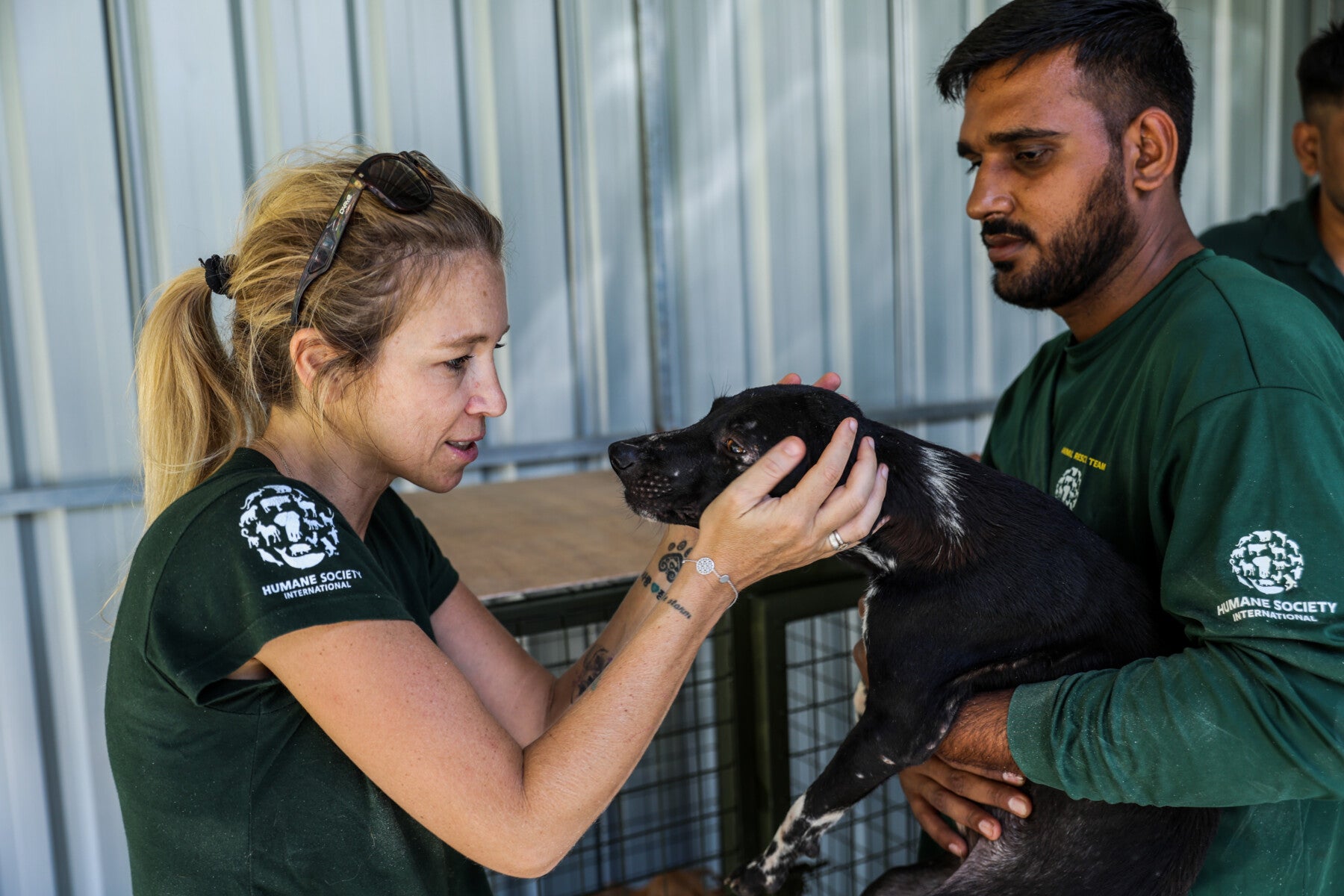
JAKARTA, Indonesia—Twenty four dogs rescued from a slaughterhouse at Indonesia’s Tomohon “Extreme” Market in North Sulawesi province have flown from Indonesia to the United States in search of loving families. Poppy, Romeo, Wendy, Mia, Rocky and friends were saved by animal charities Humane Society International and Animal Friends Manado Indonesia after the organizations negotiated an historic ban on the dog and cat meat trades at the Tomohon market in July last year.
HSI transported the 24 dogs, including Abbie, Lano, Jilly, Oliver and Root, to its care and rehabilitation center near Washington, D.C., in the United States, where they are now receiving soft beds, nutritious food, toys, veterinary care and time to heal from their ordeal. After this initial phase, they will be placed with shelter and rescue partners where they will be prepared for adoption into loving homes.
On the day the market ban came into force, the HSI and AFMI campaigners saved a total of 25 dogs and three cats from being bludgeoned and blowtorched to death for human consumption. One dog named Daisy was subsequently adopted by HSI rescuer Lola Webber who lives in Indonesia, and all three cats also found loving homes on the island country. More than 130,000 dogs and countless cats annually are slaughtered in public markets across Indonesia’s island of Sulawesi, with more than 1 million dogs a year killed for the meat trade nationwide.
Lola Webber, HSI’s director of Ending Dog Meat campaigns, said: “For dogs like Daisy, change came literally just in time in Tomohon. As proud adopter of Daisy, who utterly stole my heart when we rescued her, I am filled with hope for these wonderful dogs as they begin their journey to find happy homes in the United States. Daisy was at one of the slaughterhouses we closed down that supplied Tomohon Extreme Market, and which alone had killed hundreds of these terrified animals every week for years. It was a filthy place with a blood-stained floor and emaciated dogs crammed in steel cages, peering out desperately. I will never forget the look of fear in their eyes.
These poor animals witnessed and experienced unimaginable brutality and traumatizing cruelty. But I know how transformative love can be for dogs and cats rescued from the meat trade. Sweet Daisy is living proof that with kindness, patience and compassion, these dogs can look forward to happy futures surrounded by families who love them. Daisy is adored by my husband and me and our four children, and is living the life all dogs deserve. I can’t wait to see the same happy ending for Romeo, Poppy, Rocky and friends.”
The ban at Tomohon market introduced by Mayor Caroll Senduk not only shut down this cruel trade at the market itself, but also impacted the vast network of animal thieves and traffickers across the entire province for whom sales at the market were a prime motivation. As a leading member of the Dog Meat Free Indonesia coalition, HSI has helped achieve bans on the dog and cat meat trades in 40 cities and regencies so far, with provinces also pledging action to eradicate the trade, and the charity aims for further victories in 2024. The ultimate goal is a nationwide ban on the dog and cat meat trades, which HSI hopes Indonesia’s policy makers will feel inspired to introduce following the ban just passed in South Korea.
Ms Webber says: “In addition to the immense animal suffering the dog and cat meat trades cause, they also pose a very real danger to public health, particularly through the spread of the deadly rabies virus. Dog capture, transport, killing, butchery and consumption can all facilitate rabies transmission, and rabies-positive dogs have been found for sale at markets throughout Indonesia. So, there are compelling animal and human welfare reasons for Indonesia to be the next country in Asia to finally ban this trade.”
In November last year a host of Hollywood and Indonesian stars wrote a letter to President Joko Widodo urging him to ban the dog and cat meat trades. The letter, signed by stars including Kim Basinger, Courteney Cox, Andie McDowell, Dame Judi Dench, Alicia Silverstone, Leona Lewis OBE, Daisy Fuentes, Billie Eilish, Charlize Theron and Clint Eastwood, alongside Indonesian mega-stars Bubah Alfian, Cinta Laura Kiehl, D.J Bryant, Davina Veronica, Luna Maya, Prilly Latuconsia, called for a ban “so that we can soon celebrate a truly dog and cat meat-free Indonesia.” The stars went on to say: “We stand strong with the overwhelming majority of Indonesian citizens and international visitors who oppose the dog and cat meat trades and believe in protecting animals from cruelty and exploitation.”
HSI’s rescues and dog transports are conducted in compliance with national and local animal and public health recommendations. Following their rescue, the animals were evaluated by a veterinarian, treated for endo- and ectoparasites, vaccinated against rabies, distemper, hepatitis, parvo virus, parainfluenza, leptospira and screened for illness as needed to ensure the health of each animal and to comply with international export and import requirements. On arrival in the United States, the dogs were further cleared by the Centres for Disease Control and Prevention before being received at the care and rehabilitation center.
Download photos and video of the dogs and cats being rescued here
Download photos and video of the dogs on their Indonesia to USA journey here
Download photos and video of the dog meat trade at Tomohon Extreme Market (May 2023) here
A list of the shelter and rescue partners at which the dogs are placed will be available here once that information becomes available.
ENDS
Media contacts:
- Indonesia: Lola Webber, lolawebber@yahoo.co.uk +62 813 37408768
- UK: Wendy Higgins, whiggins@hsi.org
‘This is history in the making I never thought I would see in my lifetime,’ says JungAh Chae, director of HSI/Korea
Humane Society International / South Korea
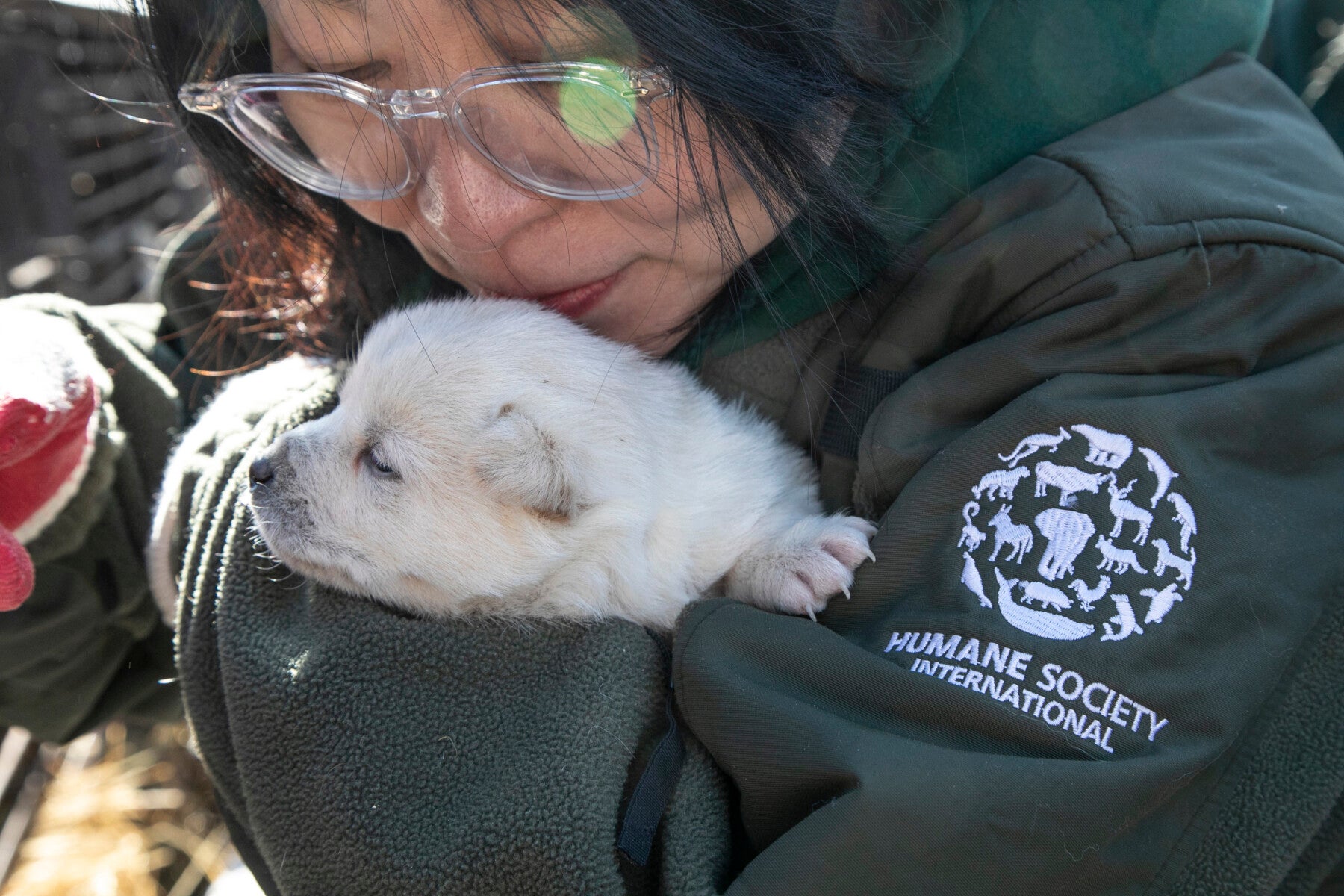
SEOUL—South Korea’s National Assembly has today voted through a ban on the dog meat industry in what animal campaigners at Humane Society International/Korea have called “history in the making.” Up to 1 million dogs a year are factory farmed and killed for human consumption in the country. The ban, which comes into force in six months’ time with a three-year phase out, will make the breeding, slaughter and sale of dogs and dog meat for human consumption illegal from 2027, with penalties of up to three years’ imprisonment or a fine of up to 30 million KRW.*
This news follows considerable public and political momentum. With over 6 million pet dogs now living in Korean homes, demand for dog meat is at an all-time low. A 2023 Nielsen Korea opinion poll shows that 86% of South Koreans won’t eat dog meat in the future and 57% support a ban.
JungAh Chae, executive director of Humane Society International/Korea, which has campaigned tirelessly for a ban, welcomed the news by saying: “This is history in the making. I never thought I would see in my lifetime a ban on the cruel dog meat industry in South Korea but this historic win for animals is testament to the passion and determination of our animal protection movement. We reached a tipping point where most Korean citizens reject eating dogs and want to see this suffering consigned to the history books, and today our policymakers have acted decisively to make that a reality. While my heart breaks for all the millions of dogs for whom this change has come too late, I am overjoyed that South Korea can now close this miserable chapter in our history and embrace a dog-friendly future.”
Dog farmers, slaughterers and restaurant owners will be eligible to apply for compensation, and after review, government support will be offered to transition or close those businesses, similar to the Models for Change program run by HSI/Korea. Since 2015, HSI has helped 18 dog farmers across South Korea switch to growing crops such as chili plants and parsley, or water delivery and other livelihoods.
HSI/Korea urges the government to use the three-year phase out period to work with animal groups including HSI/Korea to rescue as many dogs as possible in a state-sponsored, coordinated effort.
Kitty Block and Jeff Flocken, respectively CEO and president of HSI globally, issued a joint statement, saying: “This is a truly momentous day for our campaign to end the horrors of the dog meat industry in South Korea, and one we have been hoping to see for a very long time. Having been to dog meat farms, we know only too well the suffering and deprivation these desperate animals endure in the name of an industry for whom history has now thankfully called time. This ban signals the end of dog meat farming and sales in South Korea, and we stand ready to contribute our expertise until every cage is empty.”
South Korea now joins a growing list of countries and territories across Asia that have banned the dog meat trade (with varying degrees of enforcement), including Hong Kong, Taiwan, the Philippines, India, Thailand and Singapore, as well as the cities of Shenzhen and Zhuhai in mainland China, Siem Reap province in Cambodia, and 45 cities, regencies and provinces in Indonesia.
Download video and photos of HSI/Korea’s dog meat farm closure program in action here.
ENDS
Media contacts:
- South Korea: Haewon Lee, media and communications manager; hlee@hsi.org
- United Kingdom: Wendy Higgins, director, international media; whiggins@hsi.org
Notes: The legislation includes a penalty of up to two years of imprisonment or a fine of up to 20 million KRW for the breeding and sale of dogs for consumption, and up to three years of imprisonment or a fine of up to 30 million KRW for the slaughter of dogs for human consumption.
Humane Society International / South Korea
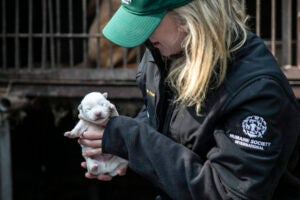
SEOUL—One month after the South Korean government announced a bill to ban the dog meat industry, 27 dogs rescued from a dog meat farm in Asan, Chungcheongnam-do have flown to the United States in search of loving homes. At the time of rescue in March this year by animal charity Humane Society International/Korea, these dogs—including Bumblebee, Parker, Trudy, Bruno and Mia—had not even been born yet when HSI/Korea saved their pregnant mums. Although previously too young to fly overseas, Nana, Nadia, Corbin, Covy Chico and the others are now old enough to make the journey. Mother dogs Raspberry and Zelda will also fly with their grown pups.
All had been fated to be killed for their meat as part of an industry that breeds and slaughters up to 1 million dogs a year for human consumption. They were saved as part of a 200-dog rescue when HSI/Korea worked with the farmer, who wanted to leave dog farming behind him and convert his land into a self-sufficient crop field growing cabbages and other vegetables.
With five legislative bills to ban the dog meat industry, and now the commitment of a government-backed bill, HSI/Korea says these 27 dogs are a reminder to policy makers that campaigners are counting the days for politicians to take action on a ban. The latest opinion surveys by Nielsen Korea in 2023 show that most South Koreans (87.5%) don’t eat dog meat and 56% support a ban.
Sangkyung Lee, HSI/Korea’s End Dog Meat campaign manager, helped rescue the dogs and said: “The dog meat farm where these 28 pups came from was a hellish scene. Some 200 dogs were locked in barren, metal cages in squalid conditions thick with feces, many suffering from malnutrition as well as painful skin and eye diseases. Thankfully, most of these 27 were too young to remember the trauma of those days, and it makes me so happy to know that they will soon be embraced with new names and cherished as loved family members in the United States. It’s one month since the South Korean government pledged to ban the dog meat industry, with each one of these dogs symbolising a day that we have waited for political action. We need to get this ban done so that no more dogs have to suffer for a meat that virtually no-one wants to eat.”
Since 2015, HSI/Korea’s Models for Change program has helped dog farmers in South Korea transition to new, more humane and profitable livelihoods such as chili plant and parsley growing or water truck delivery. HSI/Korea has permanently closed 18 dog meat farms so far and rescued more than 2,700 dogs who have flown to the United States, Canada and the United Kingdom to find homes, with a small number rehomed in South Korea.
After arrival in the United States, the 27 dogs will be settled at the charity’s care and rehabilitation center near Washington, D.C., where they will receive the love and comfort the dog meat industry denied them, including soft beds, nutritious food, toys, veterinary care and rehabilitation. After this initial phase, they will be transferred to shelter and rescue partners where they will be prepared for adoption into loving homes.
HSI’s rescues are conducted in compliance with national and local COVID-19 health and safety protocols. Following removal from farms, dogs were evaluated by a veterinarian. They were vaccinated against rabies, distemper, hepatitis, parvovirus, parainfluenza, leptospira, and canine influenza, and screened for respiratory illness as needed to ensure the health of each animal and comply with international export and import requirements.
Download Images of the Dogs Leaving South Korea at Incheon Airport
Download Images of the Dog Farm Rescue
ENDS
Media contact: Haewon Lee, HSI/Korea media and communications specialist: hlee@hsi.org
Owner supports Humane Society International’s campaign to ban the cat meat trade in Viet Nam
Humane Society International

THAI NGUYEN , Viet Nam—Twenty cats and kittens who were due to be drowned at a slaughterhouse in Thai Nguyen, Viet Nam, have been given a second chance at life after the owner asked animal charity Humane Society International’s local team for help to close his business for good. Thirty-seven-year-old Mr. Pham Quoc Doanh had run his cat meat restaurant and slaughterhouse for five years, drowning up to 300 cats a month to serve to customers as a dish called ‘thịt mèo’ (cat meat) and ‘tiểu hổ’ or ‘little tiger’. Regret at killing the animals, and particularly the knowledge that many were stolen pets, led him to resolve to get out of the trade for good.
The closure of Mr. Doanh’s business and the rescue of the cats is part of HSI’s Viet Nam Models for Change program, launched in the country last year after successfully operating in South Korea since 2015. The program has so far closed down two dog slaughterhouse/restaurants and one cat slaughterhouse/restaurant in Thai Nguyen.
Mr. Doanh said: “For a while now I have felt a genuine desire to leave the cruel cat meat business and switch to something else as soon as possible. When I think of all the thousands of cats I’ve slaughtered and served up here over the years, it’s upsetting. Cat theft is so common in Viet Nam that I know many of the cats sold here were someone’s loved family companion, and I feel very sorry about that. It makes me happy to know that thanks to HSI, my wife and I can now put the cat meat trade behind us and start afresh, still serving my local community but no longer as part of this brutal and crime-fuelled trade. I want to see a ban on the dog and cat meat trade in Viet Nam.”
With a one-time grant provided by HSI, Mr. Doanh is setting up a grocery store. As part of the agreement, he signed over to HSI the remaining 20 cats and kittens at his slaughterhouse so that they could be rescued and placed for local adoption. HSI rescuers removed the traumatized cats from the property on the final day of business and watched as Mr. Doanh tore down the restaurant’s “cat meat” signage, symbolising his exit from the cat meat trade.
Quang Nguyen, Humane Society International’s Viet Nam companion animals and engagement program manager, said: “We are thrilled to be closing down our first cat meat trade business in Viet Nam, and hope it will be the first of many as more people like Mr. Doanh turn away from this cruel trade. Although most Vietnamese people don’t eat cat meat, the belief still persists that consumption can cure bad luck, and the scale of the suffering is astonishing. These 20 lucky cats and kittens have escaped a terrible fate and will be found loving homes, but our work continues to see a nationwide ban on the cat meat trade that brings such pain and distress to so many.”
An estimated one million cats a year are killed for meat in Viet Nam, all stolen pets and strays snatched from the streets. Traders use food baits to lure the cats into homemade spring-loaded snares. Polls show that an astonishing 87% of people have either had a pet stolen or have an acquaintance whose pet has been stolen. Pet theft is becoming a growing societal issue in Viet Nam, with the increasing animal-loving and pet owning population frustrated with the lack of law enforcement to protect their animals from unscrupulous thieves and traders. In addition to pet theft, truckloads of both live and slaughtered cats have also been reported coming across the China border. Cats (and dogs) are frequently trafficked incredible distances across Viet Nam, even in the baggage hold of passenger buses, often travelling for more than 24hours without rest, food or water in suffocating conditions, with many dying along the way.
A recent Nielsen opinion poll (Oct. 2023) commissioned by HSI shows that cat meat is consumed by a relative minority of the Vietnamese population (21%) with the majority (71%) in favour of a ban on both cat meat consumption and trade. By far the top reasons for not consuming dog and cat meat are a belief that they are companion animals and an aversion to animal cruelty.
All 20 cats rescued from Mr. Doanh’s slaughterhouse were taken to custom-made sheltering at Thai Nguyen University of Agriculture and Forestry where they were vaccinated against rabies and will receive medical care before being made available for local adoption.
Cat meat trade facts:
- Cat meat dishes are particularly common around the capital, Hanoi, and in the northern province of Thai Binh.
- In 2018, nine cooler boxes containing almost 1 ton of frozen cats was intercepted between Dong Nai province in the south and Thai Binh province in the north.
- In 1998, the Prime Minister issued a directive banning the hunting, slaughtering and consumption of cats in efforts to encourage cat ownership to keep the rat population under control. However, little to no action was taken to combat the trade, and the directive was eventually repealed in 2020.
Download video and photos of the dog slaughterhouse closure operation.
ENDS
Media contacts:
- HSI Global: Wendy Higgins, director of international media: whiggins@hsi.org
- HSI in Việt Nam: Thẩm Phượng, director: phuongth@hsi.org
Nielsen’s online survey of Vietnamese citizens was conducted in September 2023 with recipients aged between 25–60 years old, with a total sample size of 800.
Courteney Cox, Ricky Gervais, Andie McDowell join with Indonesia’s Bubah Alfian, Cinta Laura Kiehl, D.J Bryant, Davina Veronica, Luna Maya, Prilly Latuconsia and more to support ending the brutal trades
Humane Society International / Indonesia
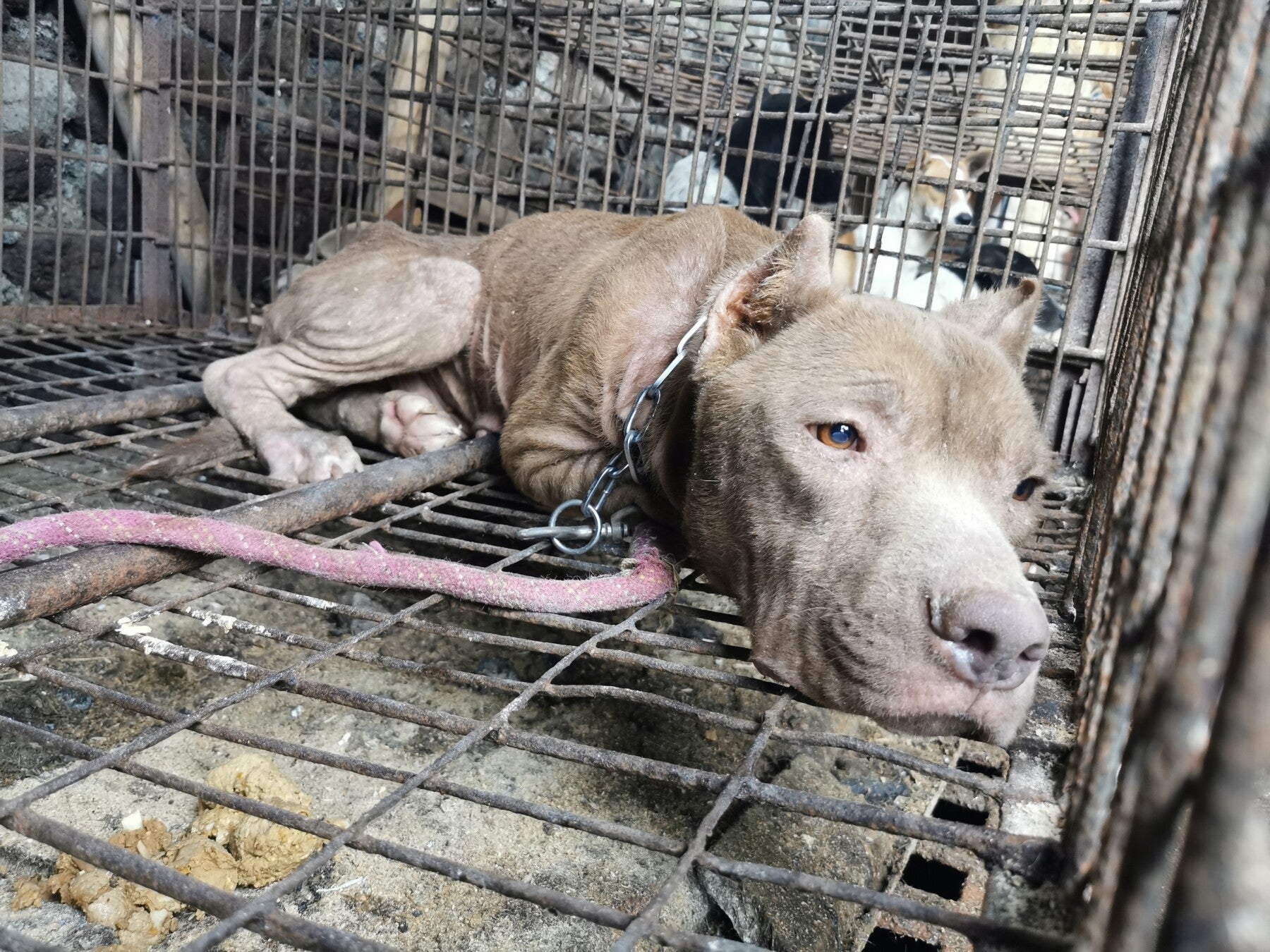
JAKARTA, Indonesia—More than 30 stars from the world of acting, fashion and music―including Billie Eilish, Charlize Theron, Clint Eastwood, Kim Basinger, Courteney Cox, Ricky Gervais, Andie McDowell, Jeff Bridges and Zooey Deschanel―have called on President Joko Widodo in a joint letter to end Indonesia’s brutal dog and cat meat trades following the rescue of desperate animals from one of the country’s most notorious markets, Tomohon Extreme Market.
More than 130,000 dogs and countless cats annually are slaughtered in public markets across the Indonesia’s island of Sulawesi. In July this year, Mayor Caroll Senduk of the city of Tomohon in North Sulawesi province worked with animal charities Humane Society International and Animal Friends Manado Indonesia to permanently shut down the sale and slaughter of dogs and cats for human consumption at the infamous market, ending years of suffering. The charities rescued the remaining animals found alive at the market’ slaughterhouse.
In the letter to the president, the stars including Dame Judi Dench, Alicia Silverstone, Alfie Boe OBE, Leona Lewis, Daisy Fuentes, Eddie Vedder, Goran Visnjic, Kristin Bauer and others praised “those leaders throughout Indonesia who have taken action to eradicate the dog and cat meat trades in their jurisdictions, saving tens of thousands of dogs and cats every month from the cruel and dangerous trades. There are now 28 cities and regencies that have passed Directives and regulations prohibiting the trades, as well as the Special Capital Region of Jakarta, and the groundbreaking and progressive action taken by the City of Tomohon in July ending the sale and slaughter of dogs and cats, and their meat, at the nation’s most infamous market – Tomohon Extreme Market.”
They ended their letter by urging the PM to ensure “a nationwide ban is introduced so that we can soon celebrate a truly dog and cat meat-free Indonesia.”
The letter, which was also signed by some of Indonesia’s biggest mega-stars including Bubah Alfian, Cinta Laura Kiehl, D.J Bryant, Davina Veronica, Luna Maya and Prilly Latuconsia, acknowledged the fact that most people in Indonesia want to see a ban. The stars wrote: “We stand strong with the overwhelming majority of Indonesian citizens and international visitors who oppose the dog and cat meat trades and believe in protecting animals from cruelty and exploitation; and applaud those leaders who have taken steps in prioritizing their citizens’ health and safety.”
The stars felt inspired to pen the letter after hearing about the dog and cat meat trade ban achieved at Tomohon Market by HSI and AFMI and their rescue of the last 25 dogs and three cats found alive at the slaughterhouses supplying the market. All six dog and cat traders who supplied and worked at the market signed an historic agreement to permanently end involvement in the dog and cat meat trades, which in turn disrupted the vast supply network of animal thieves and traffickers involved in their punishingly long-distance transport.
Animal cruelty at Tomohon market has been documented during exposés spanning many years, showing live dogs and cats cowering and shaking as traders yanked them one by one from their cage to bludgeon them repeatedly over the head and blow-torched them to remove their fur, sometimes while still conscious. Most recently, upsetting footage was filmed by HSI at Tomohon market in March and July this year, including rows of blowtorched dog and cat carcasses on display at market stalls.
Lola Webber, HSI’s director of campaigns to end the dog meat trade, said: “We are so grateful to these outspoken Indonesian and global stars who are using their voices to speak up for the millions of dogs and cats who endure the most horrific abuse for the meat trade. We echo their praise for those Indonesian leaders working with us to end this cruelty at and we join with them in urging President Widodo to introduce a nationwide ban.”
Frank Delano from AFMI said: “The dog and cat meat trades are not only obscenely cruel, but they also jeopardise public health through the spread of the deadly rabies virus during dog slaughter, butchery and consumption. So to see these celebrities stand with the majority of Indonesian citizens in calling for an end to this miserable trade is really encouraging.”
Karin Franken from Jakarta Animal Aid Network, a DMFI coalition founding member, said: “Indonesia is a popular tourist destination for travellers from the United States, Australia, the United Kingdom and Europe, so the celebrities who signed this letter are representing both the international and national community who want to see a dog and cat meat-free Indonesia. These poor animals have endured enough. We hope that President Widodo and provincial leaders take action to rid Indonesia of the scourge of this cruel and dangerous trade that tarnishes our reputation across the globe.”
Read the letter
Download video/photos of HSI rescuing of the last dogs and cats from Tomohon market
Download video/photos of the dog meat trade at Tomohon Extreme Market
ENDS
Media contacts:
- Indonesia: Lola Webber, lolawebber@yahoo.co.uk +62 813 37408768
- UK: Wendy Higgins, whiggins@hsi.org
Humane Society International/Korea urges swift legislation to ‘close this miserable chapter in Korea’s history and embrace a dog friendly future’
Humane Society International / South Korea

SEOUL—In an historic announcement, the South Korean government has stated that before the end of this year it will introduce a bill to ban the dog meat industry, which sees up to 1 million dogs a year farmed and killed for human consumption. At a meeting in Seoul today between the Ministry of Agriculture, Food and Rural Affairs, representatives of the ruling Peoples Power Party and Korean animal groups including Humane Society International/Korea, a government bill was confirmed with a three-year phase out period once legislation is passed, meaning the ban would come into effect in 2027.
Compensation will be offered to help legally registered dog meat farmers, traders, slaughterers and restaurant owners transition or close their businesses, similar to the Models for Change program run by HSI/Korea, which has worked with 18 dog farmers across the country since 2015 to switch to growing chili plants or parsley delivering water and other livelihoods.
This news follows considerable public and political momentum for a ban, including the introduction of five legislative bills by National Assembly Members. The news is welcomed by HSI/Korea, one of the leading animal groups campaigning for an end to dog meat nationwide.
JungAh Chae, executive director of Humane Society International/Korea, who attended the meeting with MAFRA, says: “News that the South Korean government is at last poised to ban the dog meat industry is like a dream come true for all of us who have campaigned so hard to end this cruelty. Korean society has reached a tipping point where most people now reject eating dogs and want to see this suffering consigned to the history books. With so many dogs needlessly suffering for a meat that hardly anyone eats, the government’s bill delivers a bold plan that must now urgently be passed by the Assembly so that a legislative ban can be agreed as soon as possible to help South Korea close this miserable chapter in our history and embrace a dog friendly future.”
With growing concern for animal welfare, and over 6 million pet dogs now living in Korean homes, demand for dog meat has dwindled. Latest opinion polls by Nielsen Korea commissioned by HSI/Korea show that 86% of South Koreans won’t eat dog meat in the future and 57% support a ban.
HSI recognizes that a short phase out period is an inevitable consequence of dismantling the trade and helping farmers and traders transition to other livelihoods. However, HSI urges the government to use the phase out period to work with animal welfare groups like HSI/Korea to rescue as many dogs as possible in a state-sponsored, co-ordinated effort.
HSI/Korea’s Models for Change program has rescued more than 2,700 dogs from dog farms across South Korea who have found adoptive homes in the United States, Canada, the United Kingdom and the Netherlands, with a small number rehomed in South Korea. Most of the farmers with whom HSI/Korea has worked experience mounting societal, family and financial pressure to get out of farming dogs.
Kitty Block and Jeff Flocken, respectively CEO and president of HSI globally, issue a joint statement, saying: “This is a momentous day for HSI’s campaign to end the horrors of the dog meat industry in South Korea, and one we have been hoping to see for a very long time. Having been to dog meat farms and seen HSI/Korea’s Models for Change program in action, we know only too well the suffering and deprivation these desperate animals endure in the name of an industry for whom history has now thankfully called time. This is the beginning of the end of dog meat farming in South Korea, and HSI stands ready to contribute our expertise until every cage is empty.”
Dog meat facts:
- Although most people in South Korea don’t eat dog, the belief that dog meat soup (bosintang) will cool the body and build stamina during the hot summer, particularly during Bok Nal season spanning July and August, still holds with some, especially the older generation.
- Most dogs slaughtered for meat in South Korea are killed by electrocution although some are also hanged.
- Dog meat is banned (with varying degrees of enforcement) in Hong Kong, Taiwan, the Philippines, India, Thailand and Singapore, as well as the cities of Shenzhen and Zhuhai in mainland China, Siem Reap province in Cambodia, and 32 cities and regencies as well as the province of DKI Jakarta in Indonesia.
- Despite these growing bans, an estimated 30 million dogs a year are still killed for meat across Asia.
Download here video and photos of HSI/Korea’s dog meat farm closure program in action
ENDS
Media contact:
- South Korea: JungAh Chae, director HSI/Korea, jchae@hsi.org
- United Kingdom: Wendy Higgins, director international media, whiggins@hsi.org
The course, led by HSI/Mexico, aims to empower and educate first responders and other authorities on animal welfare in cases of cruelty and disaster
Humane Society International / Mexico

TEPIC, Nayarit—This week, Humane Society International/Mexico conducted a training aimed at strengthening Nayarit’s response to animal cruelty and disaster situations. The event brought together 75 participants from a diverse group, including personnel from 911 emergency services, public prosecutors, municipal and state police, civil protection and firefighters and members of the Nayarit State Commission for the Protection of Fauna.
The comprehensive training covered a spectrum of crucial topics, including receiving reports of animal abuse and how to triage, assessing animal welfare based on the scientific model of the five domains, combatting dogfighting and including pets in disaster prevention plans.
“We want to take this opportunity to extend our congratulations to the General Prosecutor’s Office of Nayarit for the recent establishment of the Specialized Public Prosecutor’s Office for Domestic Animal Abuse Crimes,” said Claudia Edwards, program manager at Humane Society International/Mexico. “We’re grateful to see the prosecutor’s office prioritizing the safety and welfare of animals.”
A small evacuation drill was also carried out by the attendees with the guidance of civil protection and state firefighters.
#
